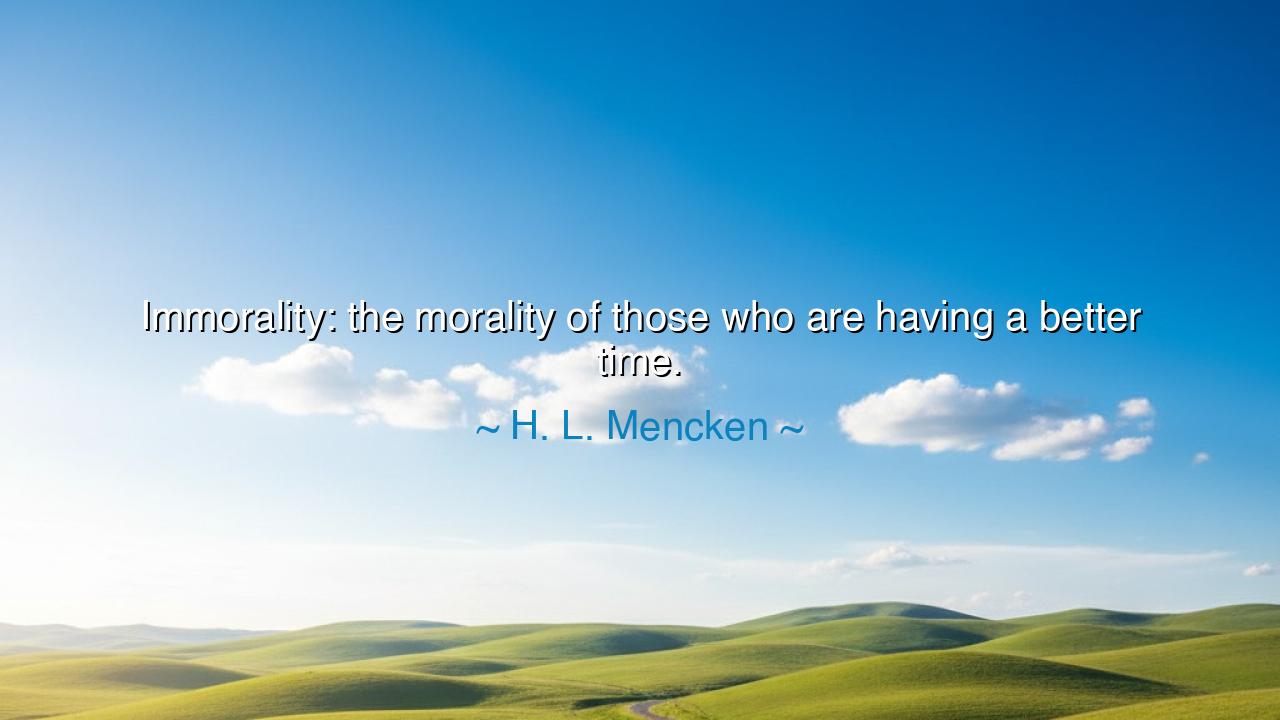
Immorality: the morality of those who are having a better time.






The sharp-tongued critic of society, H. L. Mencken, once offered a phrase both witty and piercing: “Immorality: the morality of those who are having a better time.” At first glance it sounds as jest, the laughter of a cynic at the follies of men. Yet within the jest lies the gravity of truth: morality is often not the shining code of eternal justice we imagine, but the weapon of the envious, the fearful, and the constrained. What some call immorality is oftentimes nothing more than joy lived outside their own bounds of comfort.
The origin of these words arises from Mencken’s broader mission: to expose hypocrisy in society. Living in early twentieth-century America, he saw how people cloaked jealousy and fear with righteous judgment. He watched as the pleasures of others—be it music, laughter, or freedom of thought—were condemned not because they were evil, but because they disturbed the fragile order of those who preferred restraint. To him, immorality was a label not for sin, but for joy denied to others. Thus, morality itself became a relative mask, worn by those who wished to bind others to their own rules.
The ancients knew this truth as well. Consider the tale of Socrates, condemned for corrupting the youth of Athens. What was his crime but asking questions, awakening minds, and leading men to think freely? To the guardians of tradition, this was immorality—a dangerous delight of the intellect. Yet for the youth who learned to examine life, it was liberation. Here we see Mencken’s insight: what the fearful call immoral may, in truth, be the richer path of life.
Or look to the story of Galileo Galilei, who dared to lift his eyes to the heavens and proclaim that the earth moved around the sun. To the churchmen of his day, such words were heresy, immorality against divine order. But in truth, it was a man rejoicing in discovery, embracing the grandeur of the cosmos. His “immorality” was nothing but the courage to have a better time with truth, even at the cost of censure.
What lesson, then, do we draw from Mencken’s words? It is this: beware of condemning the joys of others merely because they are not yours. Beware of cloaking envy in the garb of righteousness. The laughter of others, the freedom of others, the passion of others—these are not threats to your morality, unless your morality is built on chains. True virtue does not wither in the face of joy, but celebrates it, learns from it, and is enlarged by it.
Yet take caution also: Mencken does not say that all things are good, nor that every pleasure is wise. Rather, he unmasks the hypocrisy that brands what is different as evil. The true task of the wise is to discern between pleasure that enriches life and pleasure that destroys it. To live by freedom is noble, but to live without care for consequence is folly. Thus, wisdom is balance—enjoying joy without turning it into tyranny over the self or others.
Therefore, O seeker of truth, let this teaching guide you: do not hastily call “immoral” what is merely unfamiliar. Ask instead: does it bring life, or does it bring harm? Do not envy those who rejoice, but learn how they have found their song. And if your joy is condemned, wear the accusation lightly, for perhaps it is not your soul that is corrupt, but their spirit that is bound.
So remember Mencken’s eternal jest: immorality is often the name given to freedom by those too afraid to taste it. Walk wisely, rejoice freely, and live not to please the envious, but to stand in truth, dignity, and joy.






AAdministratorAdministrator
Welcome, honored guests. Please leave a comment, we will respond soon